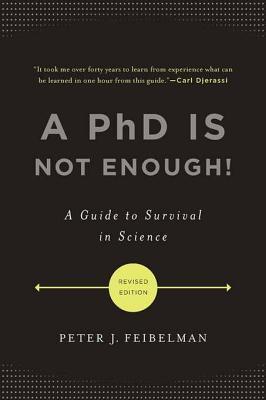
A PhD Is Not Enough!: A Guide to Survival in Scien
Peter J. Feibelman
Questions & Answers
The essential survival skills for young scientists include selecting appropriate research problems, managing projects, giving compelling talks, publishing noteworthy papers, and securing funding. These skills differ from traditional academic training in several ways:
-
Problem Selection: While academic training emphasizes technical skills, survival skills focus on identifying and pursuing significant scientific problems, often requiring strategic thinking and foresight.
-
Project Management: Survival skills involve understanding project timelines, prioritizing tasks, and balancing long-term goals with short-term deliverables, which is not typically emphasized in academic programs.
-
Communication: Effective communication, including giving talks and writing papers, is crucial for career advancement. These skills are often not formally taught in academic settings but are vital for survival in the scientific community.
-
Networking: Building a professional network and seeking mentorship are essential for career development, which is often overlooked in traditional academic training.
-
Funding Acquisition: Survival skills include writing grant proposals and understanding how to secure funding, which is a critical aspect of a scientist's career that is not typically covered in academic curricula.
Young scientists can effectively choose a thesis advisor and navigate postdoctoral positions by focusing on several key factors:
-
Select an Advisor: Look for a mentor who is accessible, has a clear vision, and is willing to teach survival skills. Consider a tenured professor over a junior one, as they are less likely to move and can offer more stability.
-
Postdoctoral Position: Prioritize projects that can be completed within your postdoc tenure and ensure they align with your career goals. Choose a supervisor who values collaboration and can provide valuable recommendations.
-
Networking: Build connections with peers and established scientists to gain insights and opportunities. Networking can lead to collaborations, job offers, and valuable advice.
-
Communication: Clearly communicate your research goals and expectations to your advisor and colleagues. This fosters a productive working relationship and helps you stay focused on your objectives.
-
Publishing: Aim to publish your work regularly to establish your reputation and demonstrate your ability to contribute to the field.
-
Balance: Strive to balance research, teaching, and other responsibilities to maintain a healthy work-life balance and avoid burnout.
By focusing on these aspects, young scientists can lay a solid foundation for a successful career in science.
The key differences between academic, industrial, and government lab positions lie in their focus, job security, and work-life balance.
Academic positions emphasize research and teaching, offering tenure for job security but with lower pay and more teaching responsibilities. Industrial labs focus on applied research and product development, providing better pay and less teaching but with potential job insecurity. Government labs balance research and applied work, with moderate pay and job security, but less freedom in research direction.
Young scientists should consider their career goals, research interests, and work-life balance. Academics suit those passionate about basic research and teaching, while industry and government labs are better for those interested in applied research and a faster-paced career. Personal values and lifestyle preferences should also guide the decision.
Young scientists can effectively communicate their research through clear, concise talks and publications. Key practices include:
-
Talks: Prepare and rehearse talks to ensure clarity and brevity. Avoid technical jargon and focus on the core concepts. Engage the audience with questions and interactive elements. Use visuals sparingly and ensure they enhance understanding.
-
Writing Papers:
- Titles and Abstracts: Craft compelling titles and concise abstracts that highlight the research's significance.
- Structure: Follow a logical structure, including an introduction, methodology, results, discussion, and conclusion.
- Clarity: Write clearly and concisely, avoiding jargon where possible. Use active voice and avoid overly complex sentences.
- Citations: Properly cite relevant literature to demonstrate understanding of the field and to give credit to others.
- Revising: Revise and edit thoroughly to ensure accuracy and clarity.
Best practices for writing compelling scientific papers involve focusing on the research's significance, clarity, and logical organization, while also considering the audience and the purpose of the publication.
To secure funding, focus on writing compelling proposals that articulate your research's significance and potential impact. Tailor your application to the funding agency's goals and demonstrate a clear understanding of the "big picture." Establish a successful research program by being problem-oriented, prioritizing short-term, publishable projects, and working on multiple projects simultaneously to reduce the risk of being scooped. Maintain a balance between productivity and well-being by setting priorities, saying no to excessive commitments, and leveraging networking opportunities to build a supportive community. Remember, effective communication, strategic thinking, and self-care are crucial for long-term success in science.